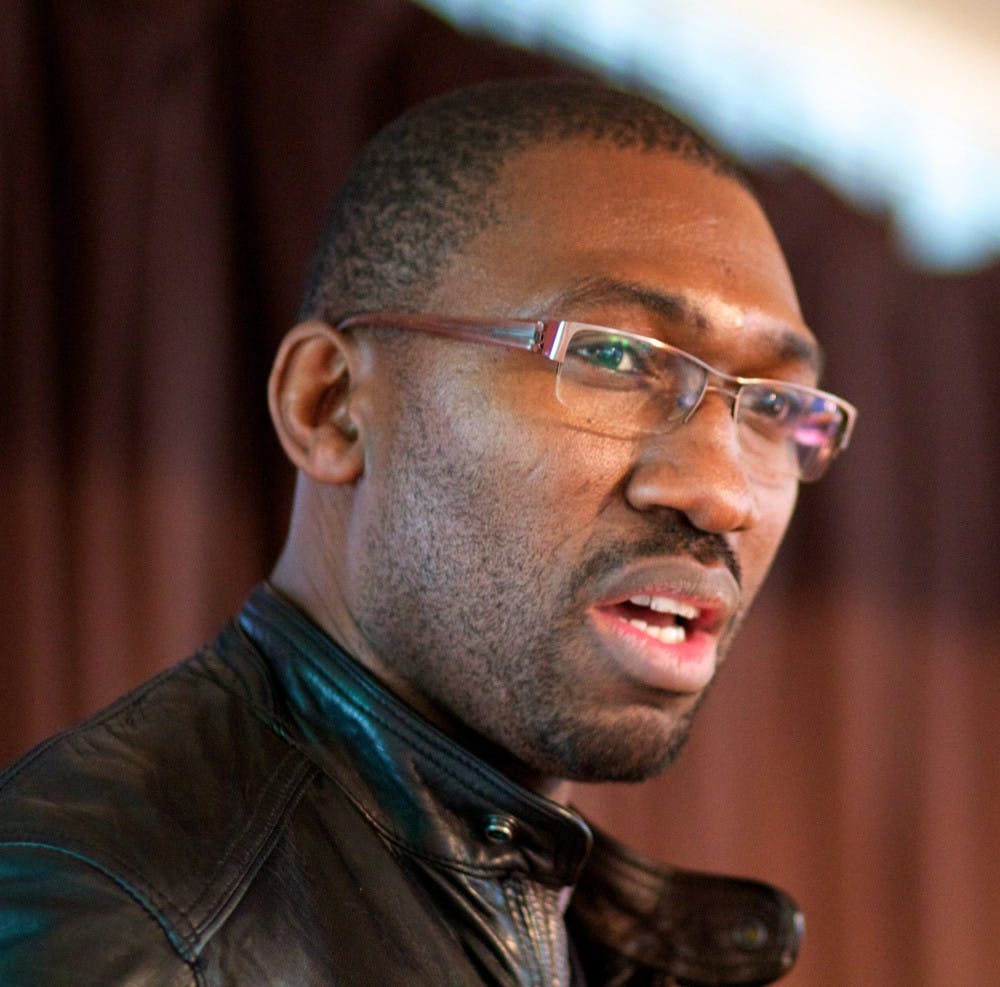The Fall Play Lab at Center Stage featured the performance of two one-act plays that were edited and revised over the course of the weekend. Audiences were able to engage with and comment upon the two original works: Handle It, by Rachel Knoblauch and To the Flame, by Miranda Rose Hall.
Handle It centered around its protagonist, Elena, the head of a successful publishing firm, and her increasingly unhealthy relationship with her partner John. He does not appreciate her intelligence or her love for her work and increasingly works to dominate her life.
Through the symbolism of a vision of a door that appears to Elena in several positions, we watch her struggle to understand herself within the context of a relationship that no longer brings her the personal fulfillment it once did.
To the Flame tells the story of a family helmed by an alcoholic father dwelling in the mountains of Kentucky. His daughters, Ella Kay and Sissy, begin to commune with the forest moths in hopes of escaping their father’s increasingly erratic and sometimes violent behavior.
One flashback scene from To the Flame shows the girls’ parents, Walter and Teeny, walking through the woods together. We soon find out that this is where their father proposed, tying together the more idealistic past and harsh present.
Both plays featured the same cast of five actors, Anne Bowles, Aaron Bilden, Tia Shearer, Ben Kress and Anna DeBlasio. Bowles, Bilden and Shearer are members of the Actors’ Equity Association. There was also an additional person whose role was to read aloud the stage directions. For Handle It and To the Flame, this inclusion of the stage directions helped to accentuate the symbolic elements, the door and the moths, respectively.
Gavin Witt, the director of the Fall Play Lab and an associate director of Center Stage, described Play Lab as a developmental laboratory for new plays and spoke about the preparatory process.
Witt highlighted the importance of the audience in the room during intermission, to ensure that the audience would be able to best recall and comment upon the content of both plays equally.
The five actors who appeared in both plays arrived and met with the two playwrights, Hall and Knoblauch, on Thursday.
Over the span of the next three days both playwrights developed and altered their drafts based on notes, contributions and observations from the cast, audience members and Center Stage staff.
After both plays had been performed, the team of actors left the room and both playwrights and a moderator took seats in the front of the room. Dramaturg Rebecca Adelsheim ably guided the discussion through her thoughtful questions, and this ending conversation allowed for the audience to give feedback and ask questions about different aspects of the plays which they found puzzling or intriguing.
One audience member spoke about how much she had enjoyed the magical realism of the moth motif within To the Flame, while another spoke about how nuanced the depiction of Elena’s increasing restriction by John was shown throughout the monologues in Handle It.
Both playwrights had the opportunity to discuss how these live readings influenced the production of their work. They also explained how the opportunity to have actors and an audience provide feedback helped them move their work in new directions.
Hall and Knoblauch were asked about how they planned to continue the development of the plays and about their inspiration for each production. Both writers spoke about how the Play Lab experience aided them in developing their plays over the weekend.
Knoblauch spoke about how the rehearsal process, as facilitated by the PlayLab, allowed her to get fresh takes on her work.
“It’s so exciting and interesting to have those lines which have such a clear intonation and pace and rhythm to them in my head read completely differently out loud,” she told the audience. “And you find out oh, that really doesn’t work or oh my gosh that really does work in a way that I totally wasn’t expecting.”
Knoblauch reflected on how hearing the lines aloud was a new persepctive on what she had written.
“That group of voices teased out these little details that I as one person never had the brain-space to imagine,” she said.
Hall also spoke about the ways in which repeated rehearsals helped her during the playwriting process.
“One of my teachers talks about this triangular relationship. The playwright’s tools being actor, ether and language. I feel like I can only really encounter language by myself.”
The playwright stressed the value of readings in understanding the “ether” element of the work.
“When I come into a room of actors and when we get to rehearse something, I find that the ether element is one of the most informative to figure out exactly how much space a line or a beat or an idea takes up,” she said. “I get to learn where the power centers are in my plays.”
Baltimore Center Stage is committed to the development of new and original plays and offers a Hot Desk Playwright Residency each year. Knoblauch is this year’s Hot Desk Resident Playwright, and Hall was the 2013-2014 Hot Desk Resident Playwright.
Currently running on the Center Stage Mainstage is The Christians by Lucas Hnath, a drama set at a present-day American megachurch and featuring performances from the choirs of Baltimore-area churches.





